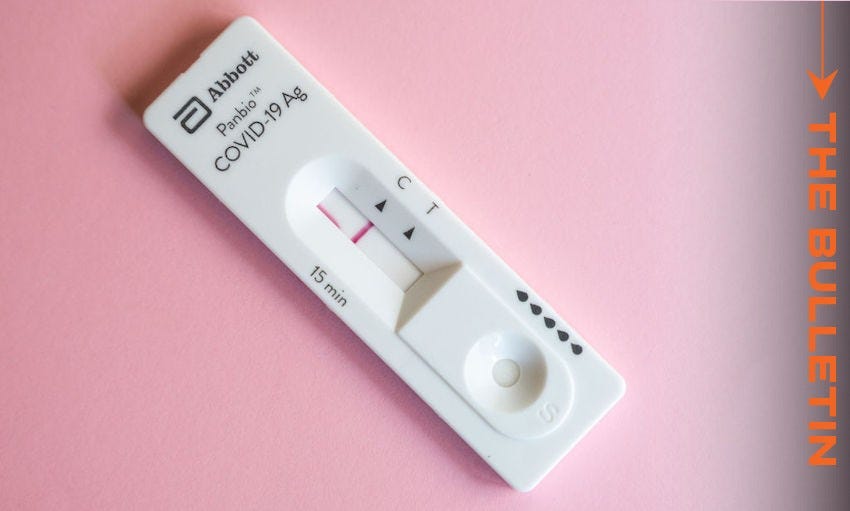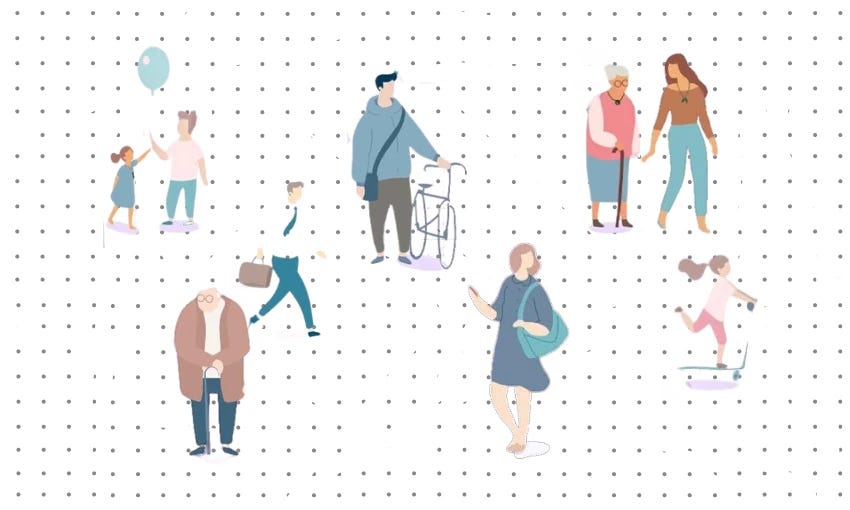PSA: It's the last day to get free Covid-19 tests
Does it signal a shift in how we view the virus?
Mōrena, and welcome to The Bulletin for Monday, September 30.
In today’s edition: What we weren’t told about the recent rise in violent crime, officials warned that tobacco company could be biggest beneficiary of excise tax cut on heated tobacco products, and 35,000 in Dunedin marched against the downgrade of the city’s hospital build. But first, as we learn to live with Covid, we’ll also have to learn to pay for testing.
Tests to cost
Welcome back, I hope you’ve all adjusted to the clocks being shifted forward. I’m not sure I quite have.
From tomorrow, a major milestone in our Covid-19 response will be marked – though it’s perhaps not one everyone will be aware of, or welcome. Rapid antigen tests (or Rats) will no longer be freely available from October 1. As this RNZ explainer details, while Covid-19 testing will still be available, you’ll have to pay for the privilege – a pack of five is advertised online as $16.99 at Chemist Warehouse. It’s been about four years since free Covid testing was rolled out, with people able to pick up rapid tests at pharmacies or specialised collection points for no cost. In June, reported the Herald, health minister Shane Reti confirmed the government was extending the supply of free tests through until the end of September to make sure they were available across winter when illnesses tend to surge.
‘Depressing’
The move has left those in the health sector worried that Covid testing will become less common and only something done by people who can afford it. Microbiologist Siouxsie Wiles called the end of free rat tests “depressing”, in comments shared via the Science Media Centre. “Rapid antigen tests are a really important tool to help people determine whether they have Covid-19 and, if so, take the necessary precautions to prevent spreading the infection to others. They shouldn’t only be available to those who can afford to buy them,” she said.
Otago University’s Michael Baker agreed, expressing concern that removing the funding for Covid tests would limit who tested and could mean further exposure to the virus. As The Press reported, Shane Reti said that free testing was never intended to last forever and the focus now was maintaining access to vaccines and therapeutics. But official health advice still urges people test for Covid if they’re symptomatic, and isolate for five days if the result is positive. It’s also still encouraged that confirmed cases of Covid are lodged online (though official numbers suggest many people are not doing this). It’s not a stretch to foresee fewer people testing, and therefore fewer people isolating, if tests aren’t freely accessible.
Learning to live with Covid
The end of free testing signals a shift in how we view Covid-19. Late last year, the Herald’s Thomas Coughlan reported the government was considering ending free universal vaccinations for Covid-19 as part of its cost-cutting drive (not everyone can access free flu vaccinations and the eligibility rules were adjusted earlier this year, though Covid jabs remain free for everyone aged over five). In a piece for NZ Doctor (paywalled), Fiona Cassie described Covid-19 “business as usual” when discussing the decision to axe funding for free Covid-related GP consultations.
All of this suggests that we are now learning to live with a virus we once attempted to stamp out completely.
It’s something the rest of the world is grappling with as well. Writing for The Conversation last year, Auckland University’s Paula Lorgelly explained that The Netherlands has not had subsidised testing since October 2021, while Australia has made tests free for concession card holders, and states may have additional allowances. In the United States, reported CBS, the government has confirmed free testing will resume later this month after a summer wave of Covid-19 cases. In her piece, Lorgelly noted that as we increasingly learn to live with the virus, as we do with other illnesses like the flu, there is a need to re-evaluate the public provision of tests, vaccines and treatment. “Funding Covid vaccinations, tests and treatments means we are not able to fund other types of health care,” she wrote.
Earlier this year, it was confirmed that millions of dollars worth of expired tests along with PPE and other equipment would be converted into alternative fuels, reported Stuff’s Hannah Martin. Health NZ says any free tests collected before the end of the day will have a shelf life ranging from December 2025 to May 2027.
Does it signal ‘pandemic complacency’?
The end of free testing certainly does not signal the end of Covid-19. Lesley Gray from Otago University said about 50 people a week are still being hospitalised with the virus. In a piece for The Conversation earlier this year, health experts warned of “pandemic complacency” from both political leaders and the public, urging for a continued focus on both prevention and control of Covid. Last year, approximately 1,000 New Zealanders died from the virus and as Michael Baker and others explained in a briefing in December, new waves triggered by evolving variants can happen at any time.
Then there is Long Covid, the effects of which are still being learned. Researchers estimate it’s costing the economy $2 billion a year in lost productivity, reported RNZ. By comparison, this year’s budget allocated just $230 million over four years to Covid and pandemic preparedness. "Long Covid is more than a health crisis – it also imposes an important economic burden,” the researchers said.
Support our expanding mahi in the capital
If you value our coverage of all things Wellington, from our maps of bike networks, to local politics, to untold history, consider making a donation or becoming a member today.
What we weren’t told about the recent rise in violent crime
Earlier this month, the government revealed that the reduced violent crime target that had been announced in April was “at risk”. Just five months into a five-year goal, new data had shown that by the metric being used for the target, violent crime had been rising rapidly. In an exclusive report this morning, The Spinoff’s Alice Neville has obtained further details under the Official Information Act revealing that some of the reasons for this increase may not neatly link up with the government’s tough on crime approach.
Alice writes:
The data shows an increase in family violence, older people experiencing more violent crime, and women overwhelmingly bearing the brunt of these offences. The overall increase in violent crime, meanwhile, was likely linked to “the growing economic pressure faced by many New Zealanders”.
Costello warned tobacco company would be biggest beneficiary of tax cut
RNZ’s Guyon Espiner has another report into the inner workings of the government’s tobacco tax cuts, with officials warning that the “most benefit” will go to tobacco company Philip Morris. Associate health minister Casey Costello was told that heated tobacco products [HTPs], which had excise tax cut by half in July, were toxic and more harmful than vaping. But Costello claimed she had received her own “independent” advice and pushed ahead with the tax cut.
"Removing duty from HTPs may be viewed as in the interests of the tobacco industry, noting that the [World Health Organisation] recommendation is that HTPs should be taxed at an equivalent rate to conventional smoked cigarettes,” Costello was told in a briefing from officials. Philip Morris is the “sole supplier” of HTPs in New Zealand. "It may be that the reduction in excise taxes is not passed through to consumers in price reductions, but rather is retained by the sole importer," Treasury warned.
Have you subscribed to The Weekend with Madeleine Chapman?
It’s the perfect way to cap the week: a hand-picked selection of the best and biggest Spinoff reads along with some you may have missed. Plus, a special weekly column from The Spinoff’s editor Madeleine Chapman. Subscribe below, if you haven’t already, or find the accompanying podcast Behind the Story wherever you get your podcasts.
Click and Collect
Labour leader Chris Hipkins says the left bloc of parties is far closer to overtaking the government than recent polls suggest.
As many as 35,000 in Dunedin marched against the possible downgrade of the Dunedin Hospital build.
What’s “affordable” and “unaffordable” for the government is in the eye of the beholder, argues Hayden Donnell for The Spinoff.
Why New Zealand is pitching for a UN Security Council spot in 2039.
Government eyeing “major reform” of the building consent system.
The first Bulletin I wrote this year was on the government’s school phone ban. Five months on, Re:News asks how students are finding it.
There is enough funding for "up to 15" charter schools to be operational by term one next year, David Seymour said in a wide-ranging interview on Q+A yesterday.
Truckies say higher speed limits won’t boost freight efficiency.
Auckland mayor seeks to scrap city’s economic development agency.
We did it! New Zealand has broken the record for the largest haka in the world.
Increasing numbers of Māori are affiliating with tribal groups of under 1,000 members. Liam Rātana asks what it means for Māoridom. Joy Cowley reveals her enthralling life story – from a difficult childhood, to getting drunk with Roald Dahl – in an interview with Maggie Tweedie. Matthew Casey dives into the deeply competitive world of pinball in Aotearoa. For this week’s My Life in TV, Michelle Langstone on the most chaotic Celebrity Treasure Island player of all time. Location Location Location NZ is a bleak reminder of how much a home costs, writes Tara Ward. Zed share their perfect weekend playlist.
That’s it for this morning, thanks for reading. I’ll catch you back tomorrow.
Want to get in touch? Join the conversation in the Substack comments section or via email at thebulletin@thespinoff.co.nz if you have any feedback on today’s top stories (or anything else in the news).
If you liked what you read today, share The Bulletin with friends, family and colleagues.

















"...the “most benefit” will go to tobacco company..."
I'll bet her response was "And?"
Just concerned about the withdrawal of free COVID tests. Many pensioners would be unable to purchase these at $16.99. also this age group need the drugs to lessen the effects of COVID, and prevent hospitalisation. I think we will see more seniors hospitalised and more deaths because of this decision.